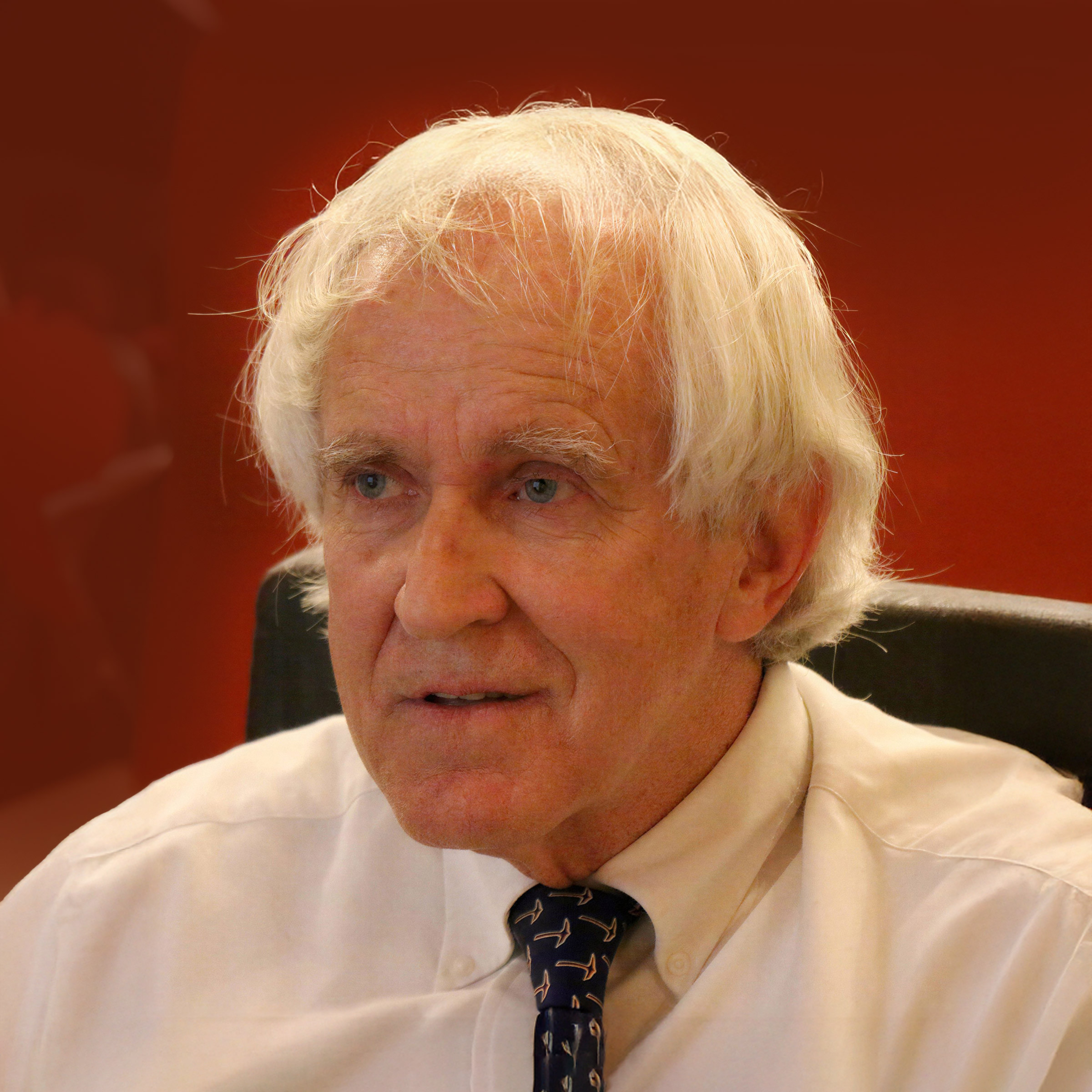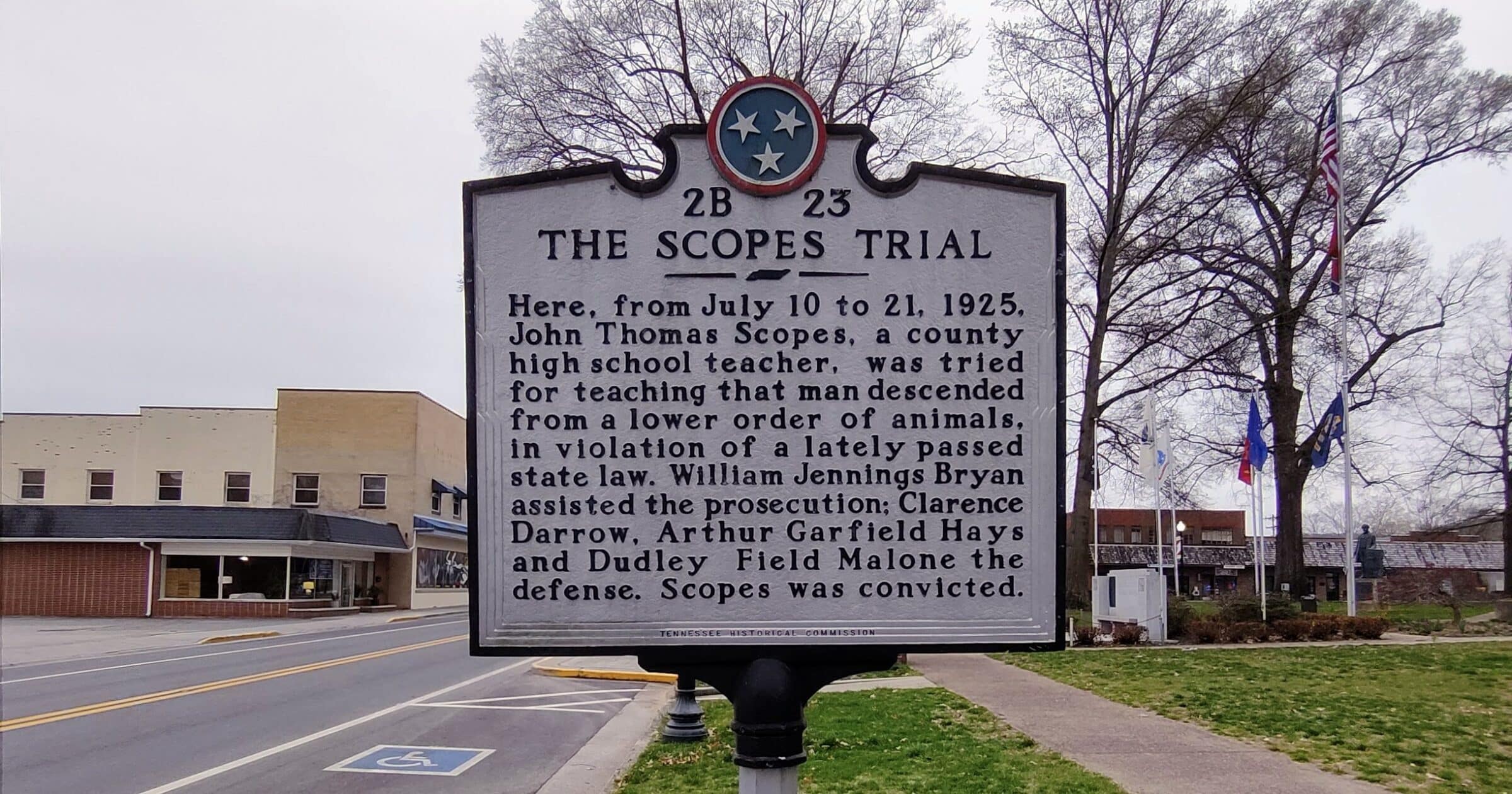Yesterday marked the end of the centennial of the infamous Scopes “Monkey” Trial, in which public school teacher John Scopes in Dayton, Tennessee, was convicted of teaching evolution. There’s been a lot of media coverage of this story — for my part, I’ve been interviewed by NPR, and World (see here, here, and here), which have provided some useful occasions to reflect on where we are in the evolution debate today. But there’s an interesting historical component to this story, which reverberates into the present. That old saying about how history does not repeat itself — but it does rhyme — certainly comes to mind.
The case came about after the Tennessee legislature passed a “monkey law,” making it a misdemeanor to teach that humans evolved. The ACLU used Scopes to test the law. Although they lost the case, many in the public perceived that fundamentalist fervor was a threat to science and education.
It should go without saying that the Tennessee state legislature’s actions to criminalize the teaching of human evolution was just about the worst way to address this issue in schools. The teaching of scientific ideas, even ones we disagree with, should never be banned or criminalized. Yet a century later, when it comes to biological origins, censorship still flourishes.
Only Loosely Depicted
After Scopes, the evolution controversy quieted until about 1960. That year a movie, Inherit the Wind, loosely depicted the trial. The film showed skeptics of Darwinian evolution as backwards, power-hungry bigots, and evolutionists as enlightened, freedom-loving scientists and educators.
Inherit the Wind has been criticized for inaccuracies. It ignored the fact that Scopes’s biology textbook, A Civic Biology, promoted a pernicious form of evolutionary racism, depicting the “negro type” as inferior to Europeans. Historian Peter Bowler calls it a “myth” that was “enshrined in the popular imagination” by the film, that “fundamentalists were exposed as country hicks…, and retreated into the hills.”
Other events reenergized the debate: for instance, 1959 saw the centennial celebration of Darwin’s Origin of Species. Evolutionary scientists like Julian Huxley gathered at the University of Chicago to declare that “Darwinism removed the whole idea of God as the creator of organisms from the sphere of rational discussion.”
A cultural clash was brewing. But it was evolutionists who now held the power.
In 1968, the ACLU helped file a lawsuit against a “monkey law” in Arkansas. That led to a Warren Court ruling that not only is it legal to teach evolution (a good thing!), but that the failure to teach evolution is effectively illegal. Ensuing cases sought to restrict teachers’ academic freedom to critique evolution. As the Supreme Court Justice Antonin Scalia remarked, we now live in an era of “Scopes-in-reverse.”
Intelligent Design Enters the Scene
Simultaneously, scientific problems began to mount with Darwinian explanations of biological complexity. In the 1970s and ’80s, paleontologists like Stephen Jay Gould at Harvard realized that Darwin’s predicted “transitional fossils” were not going to be found. In 1996, biochemist Michael Behe published Darwin’s Black Box, exploring how complex machinery in the cell and information in DNA contradict a blind evolutionary origin. These discoveries inspired today’s theory of intelligent design (ID).
At the same time, prominent evolutionists began to criticize neo-Darwinism — the modern version of Darwin’s theory. These “Third Way” scientists reject ID, but argue that neo-Darwinism can’t explain how complex biological features arise.
Last year, Denis Noble, a Third Way physiologist at Oxford, declared that “neo-Darwinism is dead,” and Third Way geneticist James Shapiro of the University of Chicago wrote that “the ID argument has a valid point with regard to the explanatory limits of neo-Darwinism.”
Some in science, however, have felt threatened by those who would critique the standard evolutionary model. A surge of persecutions has included tenure denials, job blacklisting, and speech codes. For example:
- In 2005, biologist Richard Sternberg at the Smithsonian was hounded out of his position by colleagues for the offense of editing a peer-reviewed paper, favorable to ID, in a technical biology journal.
- In 2009, paleontologist Günter Bechly was a curator at a state natural history museum in Germany when he began reading ID books and became convinced they were right. In 2015, Bechly came out publicly as an ID proponent, but then faced a hostile work environment and was forced to resign.
- In 2011, Jerry Coyne, a University of Chicago evolutionary biologist, wrote that “adherence to ID…should be absolute grounds for not hiring a science professor.” Coyne targeted Eric Hedin, a physics professor at Ball State University, for briefly teaching about ID in an honors seminar. Hedin was censored after Ball State’s president issued a speech code against intelligent design.
A One-Sided Symposium
Perhaps the most ironic recent example of evolutionary censorship took place a couple of weeks ago at Vanderbilt University in Tennessee, not far from Dayton. Vanderbilt hosted a “Scopes ‘Monkey’ Trial Centennial Symposium.” Co-organized by Vanderbilt’s Evolutionary Studies Institute and the National Center for Science Education, the symposium includes many credible speakers from science, philosophy, and law — all undoubtedly worthy of participating in the symposium. Intelligent design was on the schedule, and there was an entire session devoted to the Kitzmiller v. Dover case. Yet exactly zero pro-ID scientists or scholars were slated for the symposium.
In a recent op-ed at The Daily Wire, I recounted my long-shot attempt to encourage the Vanderbilt Scopes Symposium’s organizers to not censor scientific dissent from their conference:
In February, and again in May, I emailed the organizers of the Scopes Symposium, offering to provide names of credible pro-ID scientists who would be open to participating in their event. No one even replied to my email.
The irony is palpable: a symposium that is supposed to be remembering the dangers of censorship regarding evolution is itself practicing censorship regarding evolution!
An even worse irony is that Vanderbilt’s website hosts an official “Dialogue Vanderbilt” / “Commitment to Free Expression” page which boasts of the university’s supposed commitment to “bringing together people of differing viewpoints for a common purpose.” The page continues:
“Transformative education, pathbreaking research and the timeless search for truth all require a wide variety of viewpoints, the uninhibited exchange of ideas, the persistent challenging of conventional wisdom, and courageous and vigorous debate.
“A university that dutifully transmits canonical knowledge, but is not at the same time alive with diverse perspectives, probing critique and the practice of query and argument, is a university in name only.”
The page then lauds the importance of “institutional neutrality,” quoting former Vanderbilt chancellor Alexander Heard stating: “A university’s obligation is not to protect students from ideas, but rather to expose them to ideas, and to help make them capable of handling and, hopefully, having ideas.”
The one-sided Scopes Symposium completely rejects these ideals, aiming to “protect” students from non-Darwinian viewpoints — directly violating Chancellor Heard’s warning. By Vanderbilt’s own standards, apparently it is “a university in name only.”
What I didn’t explain in any detail was exactly what I sent to the Vanderbilt Scopes Symposium organizers. So I’d like to show a little more here, to fill in some backstory. Here’s what I wrote them in May of this year:
My email in February also noted how Vanderbilt’s website emphasizes the importance of including diverse viewpoints — even controversial ones. I then encouraged you all to consider inviting a scientist (or scientists) representing a non-evolutionary viewpoint to participate in your symposium. As I said in my email, “I could provide you with potential names of highly credible pro-intelligent design scientists and scholars who would love to participate in your event.”
I was disheartened that I received no response to my email.
It seems to me that not including any pro-ID voices in your symposium is a serious mistake. The Scopes saga is about the dangers of censorship, and how our society has overcome attempts to censor science. Yet the symposium seems to be censoring non-evolutionary viewpoints by inviting no scientists holding such a view to participate.
Moreover, the erosion of the public’s trust in science has been widely discussed in the last few years. I’m sure you all care about this, as do I. My position allows me to frequently interact with members of the public who have lost trust in the scientific community, and I can tell you precisely why this is happening: The number one factor that is driving the erosion of the public’s trust in science is a perception that the scientific community has become politicized, is trying to squelch credible minority viewpoints, and is no longer dedicated to the dispassionate empirical search for truth.
It seems to me that this Scopes Symposium is a wonderful potential opportunity for Evolution@Vanderbilt to show the public that their perceptions aren’t entirely correct, and that the scientific community IS interested in real dialogue with credible minority scientists on the topic of evolution and intelligent design! I am writing about the Scopes centennial and I would love to be able to report favorably that your event represents a positive data point in the “dialogue” trend.
Again, I’m sorry to report they never replied to my email, and they expressed zero interest in real dialogue over evolution.
We Aren’t Discouraged!
It may sound like a lot of bad news, but the reality is that from our vantage in the ID movement, we aren’t discouraged at all. We spend hardly any time thinking about Scopes or the Dover case — instead, we’re far more focused on growing ID into a vibrant research program.
The last 20 years have witnessed a great outpouring of ID research. Quite a few of these ID research projects are listed at Discovery Institute’s ID 3.0 home page, and over 170 peer-reviewed pro-ID scientific publications are described at our peer-reviewed pro-ID articles page. The actual number of peer-reviewed pro-ID scientific papers now tops 300, demonstrating discoveries like the impotence of evolutionary mechanisms to produce genetic information, and why design engineering is a better explanation for the re-use of functional features in different species.
But the research program, too, faces censorship. In 2020, two Norwegian scientists published a paper in the Journal of Theoretical Biology citing the work of leading ID theorists and arguing for “a Design Science.” Facing pressure, the journal’s editors then issued a disclaimer addressing no substantive arguments in the paper but implementing nothing less than a speech code, announcing: “intelligent design is not in any way a suitable topic for the Journal of Theoretical Biology.”
In our culture of “Scopes-in-reverse,” the power dynamic has shifted 180 degrees. A century ago, religious fundamentalists excluded evolution from education. Today, evolution advocates are doing the same to intelligent design. Thankfully, the evidence is more powerful than the censorship, which is why ID is growing despite the fact that it often faces intolerance from those who disagree with us.









































